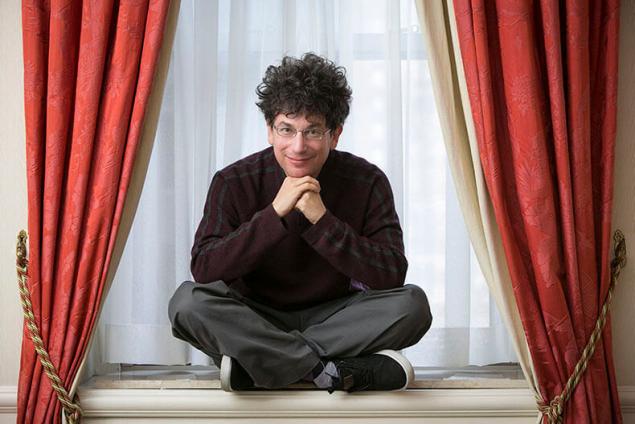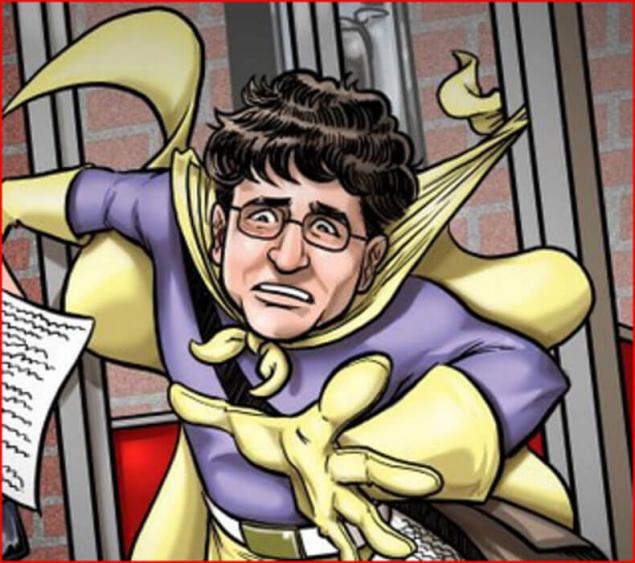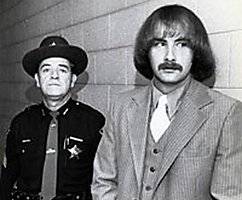James Altucher: How to become a master in any case
 Bashny.Net
Bashny.Net
James Altucher entrepreneur, trader, investor, author of several bestsellers, which was released and sold independently. In his blog he is an outspoken and, paradoxically, teaches us how to live a happier life.
Are you satisfied with your life? Whether you go to work, knowing that you can achieve more? Knowing that you have unique abilities that can make you best in the world?
This post is about how to achieve mastery. But also that it's okay not to achieve mastery in the traditional sense. You can define skill, not to use other people's definitions.
In other words, being a loser is okay.

No need to write a book to describe what a master. Most of us (and especially me) will never become masters of anything.
I'm trying. I tried to achieve this in chess. I reached the rank of "master", but that means nothing. I will never reach the international level. I tried to achieve this in writing. I write for more than twenty years.
But I know a lot of people who in their field are among the best in the world. I read their books. I talked to people and analyzed that, in their opinion, led them to mastery. I have built and sold businesses to people who in the industry has achieved excellence. I invested in the masters. So I still know who are the masters and what they do.
So treat this with skepticism, but remember that these thoughts are based on my experience and the experience of all people with whom I spoke. Here are the main elements of skill. As well as good and bad news for you.
1. Talent
I hate to say it, but talent is important. There is a myth that everyone is talented in at least something, we just have to find what. It's not true.
Most people are not talented in anything. But most people can be pretty good at something. Tim ferriss shows in his book "Cook for 4 hour" how you can become a pretty good cook after four hours of effort. I used his technique and prepared very well.
But on the occasion of the release of the book, Tim had a potluck dinner where every dish (there were, I think, eight) was prepared by a private chef. One of them was 8 years old, and his dish was probably the best. Someday he will become a master (if not already become). That's talent.
When my chess ranking was at its peak, I played a round with a girl named Irina Krush. She beat me in 25 moves. After the game she told me: "I guess when you moved the Bishop on B4, I saw your weakness." She was right. She was 13 years old. And then I immediately stopped playing in chess competitions and now play only when talking to people on the phone. She was a talented. Today it is one of the youngest women grandmasters in the world.
2. How to know your talent?
I think there are two methods.
1) Take a notebook and write down everything that you liked to do from 6 to 18 yearsbefore your life subjugated College, relationship, sucky job, mortgage, kids, responsibility, self-contempt, etc.
In his podcast, I spoke with Lewis Hosom. He said always, since childhood, dreamed of being an athlete. And yet, he is still a child used their communication skills to compensate for their weak academic skills. He found his two talents and became a master in both fields.
Often the doctor makes the combination of several "negotiantes". I don't know if I can do something to become a master, but I have always loved writing, games, and everything related to business. Maybe someday.
2) Go to the bookstore and find a subject that you're ready to read 500 books. If you want to read all 500 books on crochet, perhaps you have a talent for it.
And it's OK to be talented in anything. We are the product of all our experiences, everything that interests us all that we were flirting. This product may seem to anyone waste. But play with your garbage and be happy. If you succeed, you will get the best 0,00001%.
3. Four hours a day
All the books of Tim ferriss contain the words "4 hours...". I ask almost every master I've ever met, how many hours a day do they spend mastering their skills. They would not repeat the standard nonsense, what hammering entrepreneurs in Silicon valley: "I work 20 hours a day, and if I didn't have to sleep I'd work 30 hours a day".
You cannot become a master of something, if you work 20 hours a day. On the contrary, in your life something is very wrong, if you work so hard on something one. Typical response: "I do four hours a day." Former world chess champion Anatoly Karpov said that he could play chess for a maximum of three hours a day. This is the world champion! The rest of the time he spent on sports, learning languages, and other things that bring to his life balance.
4. History
In any area where you want to succeed, you need to study history. All art is created in context. If someone wrote the Fifth Symphony by Beethoven today, it would laugh. Andy Warhol dabbled in many areas of art before he decided to paint cans of Campbell soup at the right time. In any business the study of the history of the industry, biographies of past leaders, the successes and failures of those who have passed this way before you, it is extremely important to achieve mastery.
If I was interested in the oil drilling, I would have studied, where it was mined in the 1920s, 1950s, 1970s, what technologies have been used, what is the history of these technologies, how they improved, how to build policy around oil and so on. Somewhere in there lies the way to incredibly rich. Not for me, because I don't care about oil. But for someone else. Or for many.
5. Study your failures
Champion poker game Elon Schwartz won the Championships more than $7 million and many millions in informal cash games. We played chess until he switched first to the checkers, and then to poker. I asked him why so many people are playing poker for 20 years, but can't learn to play better.
He said: "Everyone wants to blame someone. No luck, had quarreled with his wife or something. But most importantly — we must learn to learn from your defeats. You need to make notes about the conditions in which you lost and what won. You need to think about everything."
6. Experience
To some point, you will prepare 10,000 meals. Play a million hands of poker or a thousand games of chess. Or create 20 businesses.
Very few people are immediately successful. It requires too much luck and luck favors the prepared and persistent. During these first thousand parties, or just about anything you will face failure. The best baseball players in the world are considered extremely successful if they knock the ball out of bounds "only" in 70% of cases.
When my father died, I went into his account in the online chess and saw that he played about 30 000 parties. But have not learned to play better. Many people can play 10,000 hands of poker and never get better. To make a thousand cakes and not get better.
So you need to remember your experiences, study your failures, try to note what you did right and wrong, and to remember it for the future. If future experience exactly the same as the last? Usually not. But you need to be able to conclusions like: "Hmm, this is very similar to the case four years ago, when there was A, B and C".
7. Love
Andre Agassi said that he doesn't like tennis. On the one hand, I believe him, none on the other. After all, there are a variety of types of love. Love is unconditional love, which is capable of the Dalai Lama. There is lust. There is Mature love. In some respects, a unique mix of all three. They have a lot of suffering and a lot of fun. Perhaps tennis was like that for Agassi. I do not know.
But mastery in any field involves a lot of suffering. They can not be avoided. If the suffering is too much, then we can throw this thing — it's not the worst. I don't like going to the dentist. It causes too much pain. So my teeth are not all right. I broke up with the thought of having perfect teeth.
8. Psychology
One of the reasons why most people in the world can't become really good in any case — they have no talent for anything, what is important to others. But there is another reason: these people don't want to spend the time and effort. I understand. It is often better to actively communicate, to have friends, strong family relationships, loving people.
Many people who have achieved mastery, have experienced difficulties in relationships with relatives, spouses or friends. Van Gogh cut off his ear. Dostoevsky, Kafka, Bobby Fischer, Godel never been famous for the tendency to secular courtesies, often sank into depression, had suicidal tendencies and was close to schizophrenia.
When you build a career, have an idea that you will move from success to success. Someday you will have your small room, then large, then you move into the position of CEO in another company and so on. Along the way you will face failure, but it won't be big failures.
If you aspire to mastery, then remember: you certainly will be a big defeat. Most investors don't like Tim Sykes. He has a very arrogant marketing style. But he's my friend, and I must say that he is not arrogant. He is extremely modest. Why? Because he was penniless after their first success.
In bankruptcy's no fun. With me it happened a few times. And every time you think, "This is the worst experience in my life, I wish I was dead. It was my last chance. It's all over now. And all around it's better if I die."
When Tim tried to get back to business, no one never talked to him. So he put on himself. He fulfilled all of the above points. And earned millions on trading.
The path to mastery, everything will turn out wrong. Bobby Fischer spent much of his life on the verge of schizophrenia, in agony, being unable to cope with their losses. He disappeared for years, but then returned, being stronger than before.
How do you develop it? I do not know. It is a combination of many things. This ego is a real belief that you can be the best, despite all rational evidence to the contrary and to all the people that criticize you. It is understood that there is no escape. I asked Ilona and others, what they thought, they find themselves at the bottom, and every time the answer was: "what else could I do? I kept going forward!"
9. Perseverance
Persistence creates luck. It overcomes destruction. Perseverance is a series of failures, interspersed with rare successes, and eventually those successes will start to push you to skill. Not one success, not two. But many and many.
How to remain persistent when life is filled with changing careers, relationships, responsibilities, economic crises, historical UPS and many others that can stand in your way? The answer is no. That's why it's called perseverance: doing what you have always done. Allow all the above to stop you. Use all of the above to move to a larger success, more serious lesions and then even more impressive success.
It's painful, scary, not fun, and nobody will understand why you do it. And then, when you achieve success people will act like what has happened to you is the most natural thing in the world. You try to explain, "No, there was a time when..." And they won't listen. They want to know what should be their next step that they got to where you are now.
10. Mystery
Ultimately, the mastery of mystery. You need to break the sound barrier in a certain area where nobody has done it so fast or gone so far. You have to find your own unique combination of passions that will make you the best in the world in this area.
What if you're not going to chase the mystery, and return to the familiar, comfortable, devoid of stress, the existence of colleagues, acquaintances and other people? Perhaps the world will not allow it. It may happen that what you thought were comfortable, also a myth.
History of skill shows that no one was able to predict which goals will work and which won't. So important only the present moment. In terms of health: physical, emotional, mental, spiritual. Can you today to move forward in each of these relationships?
Then you will move towards mastery and his mystery.

Good news
Do not have to be master of the world. Don't have to do any of the foregoing. Do it very few. And many of them have experienced a lot of suffering and pain and continue to experience them.
We live in a culture where the mediocre be considered almost a curse. But society is not, what is the real skill. Do not read all these articles "10 ways...". Don't listen to anyone. Even me.
See also: Stephen Hawking: While there is life, there is hope
10 principles for the digital generation
Freud said that our two goals in life is contact with others, and achievements. But often it is reasonable to overcome those imposed by the evolution task. And just be happy with those who love you. To be satisfied with all that life has to offer, every moment, not rush to the next moment of skill. True craftsmanship can be found right here and now — in how you treat yourself, for others, for their efforts and their love.
Nothing is more important. Because when you want to get to a mythical THERE, one day you will get there and realize that you missed all the fun and mystery along the way.published
P. S. And remember, only by changing their consumption — together we change the world! ©
Source: ideanomics.ru/?p=1883
Are you satisfied with your life? Whether you go to work, knowing that you can achieve more? Knowing that you have unique abilities that can make you best in the world?
This post is about how to achieve mastery. But also that it's okay not to achieve mastery in the traditional sense. You can define skill, not to use other people's definitions.
In other words, being a loser is okay.

No need to write a book to describe what a master. Most of us (and especially me) will never become masters of anything.
I'm trying. I tried to achieve this in chess. I reached the rank of "master", but that means nothing. I will never reach the international level. I tried to achieve this in writing. I write for more than twenty years.
But I know a lot of people who in their field are among the best in the world. I read their books. I talked to people and analyzed that, in their opinion, led them to mastery. I have built and sold businesses to people who in the industry has achieved excellence. I invested in the masters. So I still know who are the masters and what they do.
So treat this with skepticism, but remember that these thoughts are based on my experience and the experience of all people with whom I spoke. Here are the main elements of skill. As well as good and bad news for you.
1. Talent
I hate to say it, but talent is important. There is a myth that everyone is talented in at least something, we just have to find what. It's not true.
Most people are not talented in anything. But most people can be pretty good at something. Tim ferriss shows in his book "Cook for 4 hour" how you can become a pretty good cook after four hours of effort. I used his technique and prepared very well.
But on the occasion of the release of the book, Tim had a potluck dinner where every dish (there were, I think, eight) was prepared by a private chef. One of them was 8 years old, and his dish was probably the best. Someday he will become a master (if not already become). That's talent.
When my chess ranking was at its peak, I played a round with a girl named Irina Krush. She beat me in 25 moves. After the game she told me: "I guess when you moved the Bishop on B4, I saw your weakness." She was right. She was 13 years old. And then I immediately stopped playing in chess competitions and now play only when talking to people on the phone. She was a talented. Today it is one of the youngest women grandmasters in the world.
2. How to know your talent?
I think there are two methods.
1) Take a notebook and write down everything that you liked to do from 6 to 18 yearsbefore your life subjugated College, relationship, sucky job, mortgage, kids, responsibility, self-contempt, etc.
In his podcast, I spoke with Lewis Hosom. He said always, since childhood, dreamed of being an athlete. And yet, he is still a child used their communication skills to compensate for their weak academic skills. He found his two talents and became a master in both fields.
Often the doctor makes the combination of several "negotiantes". I don't know if I can do something to become a master, but I have always loved writing, games, and everything related to business. Maybe someday.
2) Go to the bookstore and find a subject that you're ready to read 500 books. If you want to read all 500 books on crochet, perhaps you have a talent for it.
And it's OK to be talented in anything. We are the product of all our experiences, everything that interests us all that we were flirting. This product may seem to anyone waste. But play with your garbage and be happy. If you succeed, you will get the best 0,00001%.
3. Four hours a day
All the books of Tim ferriss contain the words "4 hours...". I ask almost every master I've ever met, how many hours a day do they spend mastering their skills. They would not repeat the standard nonsense, what hammering entrepreneurs in Silicon valley: "I work 20 hours a day, and if I didn't have to sleep I'd work 30 hours a day".
You cannot become a master of something, if you work 20 hours a day. On the contrary, in your life something is very wrong, if you work so hard on something one. Typical response: "I do four hours a day." Former world chess champion Anatoly Karpov said that he could play chess for a maximum of three hours a day. This is the world champion! The rest of the time he spent on sports, learning languages, and other things that bring to his life balance.
4. History
In any area where you want to succeed, you need to study history. All art is created in context. If someone wrote the Fifth Symphony by Beethoven today, it would laugh. Andy Warhol dabbled in many areas of art before he decided to paint cans of Campbell soup at the right time. In any business the study of the history of the industry, biographies of past leaders, the successes and failures of those who have passed this way before you, it is extremely important to achieve mastery.
If I was interested in the oil drilling, I would have studied, where it was mined in the 1920s, 1950s, 1970s, what technologies have been used, what is the history of these technologies, how they improved, how to build policy around oil and so on. Somewhere in there lies the way to incredibly rich. Not for me, because I don't care about oil. But for someone else. Or for many.
5. Study your failures
Champion poker game Elon Schwartz won the Championships more than $7 million and many millions in informal cash games. We played chess until he switched first to the checkers, and then to poker. I asked him why so many people are playing poker for 20 years, but can't learn to play better.
He said: "Everyone wants to blame someone. No luck, had quarreled with his wife or something. But most importantly — we must learn to learn from your defeats. You need to make notes about the conditions in which you lost and what won. You need to think about everything."
6. Experience
To some point, you will prepare 10,000 meals. Play a million hands of poker or a thousand games of chess. Or create 20 businesses.
Very few people are immediately successful. It requires too much luck and luck favors the prepared and persistent. During these first thousand parties, or just about anything you will face failure. The best baseball players in the world are considered extremely successful if they knock the ball out of bounds "only" in 70% of cases.
When my father died, I went into his account in the online chess and saw that he played about 30 000 parties. But have not learned to play better. Many people can play 10,000 hands of poker and never get better. To make a thousand cakes and not get better.
So you need to remember your experiences, study your failures, try to note what you did right and wrong, and to remember it for the future. If future experience exactly the same as the last? Usually not. But you need to be able to conclusions like: "Hmm, this is very similar to the case four years ago, when there was A, B and C".
7. Love
Andre Agassi said that he doesn't like tennis. On the one hand, I believe him, none on the other. After all, there are a variety of types of love. Love is unconditional love, which is capable of the Dalai Lama. There is lust. There is Mature love. In some respects, a unique mix of all three. They have a lot of suffering and a lot of fun. Perhaps tennis was like that for Agassi. I do not know.
But mastery in any field involves a lot of suffering. They can not be avoided. If the suffering is too much, then we can throw this thing — it's not the worst. I don't like going to the dentist. It causes too much pain. So my teeth are not all right. I broke up with the thought of having perfect teeth.
8. Psychology
One of the reasons why most people in the world can't become really good in any case — they have no talent for anything, what is important to others. But there is another reason: these people don't want to spend the time and effort. I understand. It is often better to actively communicate, to have friends, strong family relationships, loving people.
Many people who have achieved mastery, have experienced difficulties in relationships with relatives, spouses or friends. Van Gogh cut off his ear. Dostoevsky, Kafka, Bobby Fischer, Godel never been famous for the tendency to secular courtesies, often sank into depression, had suicidal tendencies and was close to schizophrenia.
When you build a career, have an idea that you will move from success to success. Someday you will have your small room, then large, then you move into the position of CEO in another company and so on. Along the way you will face failure, but it won't be big failures.
If you aspire to mastery, then remember: you certainly will be a big defeat. Most investors don't like Tim Sykes. He has a very arrogant marketing style. But he's my friend, and I must say that he is not arrogant. He is extremely modest. Why? Because he was penniless after their first success.
In bankruptcy's no fun. With me it happened a few times. And every time you think, "This is the worst experience in my life, I wish I was dead. It was my last chance. It's all over now. And all around it's better if I die."
When Tim tried to get back to business, no one never talked to him. So he put on himself. He fulfilled all of the above points. And earned millions on trading.
The path to mastery, everything will turn out wrong. Bobby Fischer spent much of his life on the verge of schizophrenia, in agony, being unable to cope with their losses. He disappeared for years, but then returned, being stronger than before.
How do you develop it? I do not know. It is a combination of many things. This ego is a real belief that you can be the best, despite all rational evidence to the contrary and to all the people that criticize you. It is understood that there is no escape. I asked Ilona and others, what they thought, they find themselves at the bottom, and every time the answer was: "what else could I do? I kept going forward!"
9. Perseverance
Persistence creates luck. It overcomes destruction. Perseverance is a series of failures, interspersed with rare successes, and eventually those successes will start to push you to skill. Not one success, not two. But many and many.
How to remain persistent when life is filled with changing careers, relationships, responsibilities, economic crises, historical UPS and many others that can stand in your way? The answer is no. That's why it's called perseverance: doing what you have always done. Allow all the above to stop you. Use all of the above to move to a larger success, more serious lesions and then even more impressive success.
It's painful, scary, not fun, and nobody will understand why you do it. And then, when you achieve success people will act like what has happened to you is the most natural thing in the world. You try to explain, "No, there was a time when..." And they won't listen. They want to know what should be their next step that they got to where you are now.
10. Mystery
Ultimately, the mastery of mystery. You need to break the sound barrier in a certain area where nobody has done it so fast or gone so far. You have to find your own unique combination of passions that will make you the best in the world in this area.
What if you're not going to chase the mystery, and return to the familiar, comfortable, devoid of stress, the existence of colleagues, acquaintances and other people? Perhaps the world will not allow it. It may happen that what you thought were comfortable, also a myth.
History of skill shows that no one was able to predict which goals will work and which won't. So important only the present moment. In terms of health: physical, emotional, mental, spiritual. Can you today to move forward in each of these relationships?
Then you will move towards mastery and his mystery.

Good news
Do not have to be master of the world. Don't have to do any of the foregoing. Do it very few. And many of them have experienced a lot of suffering and pain and continue to experience them.
We live in a culture where the mediocre be considered almost a curse. But society is not, what is the real skill. Do not read all these articles "10 ways...". Don't listen to anyone. Even me.
See also: Stephen Hawking: While there is life, there is hope
10 principles for the digital generation
Freud said that our two goals in life is contact with others, and achievements. But often it is reasonable to overcome those imposed by the evolution task. And just be happy with those who love you. To be satisfied with all that life has to offer, every moment, not rush to the next moment of skill. True craftsmanship can be found right here and now — in how you treat yourself, for others, for their efforts and their love.
Nothing is more important. Because when you want to get to a mythical THERE, one day you will get there and realize that you missed all the fun and mystery along the way.published
P. S. And remember, only by changing their consumption — together we change the world! ©
Source: ideanomics.ru/?p=1883
Tags
See also
6 things that are productive people do every day
Tatyana Chernigov: It is important to understand how we are programmed
Michael Litvak: the Foundation of success in any business is a special kind of faith
How smart watches, sports trackers and other gadgets to measure the pulse? Part 2
HOW TO RECOGNIZE THE CHARACTER WOMAN IN SHOES
The famous Japanese gastroenterologist Hiromi Shinya about proper human diet
Tibetan Lama: 6 types of lies of European civilization

















